

Animal Farm: Napoleon. While Jones' tyranny can be somewhat excused due to the fact that he is a dull-witted drunkard, Napoleon's can only be ascribed to his blatant lust for power.
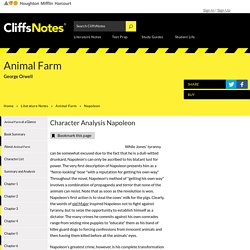
The very first description of Napoleon presents him as a "fierce-looking" boar "with a reputation for getting his own way. " Throughout the novel, Napoleon's method of "getting his own way" involves a combination of propaganda and terror that none of the animals can resist. Note that as soon as the revolution is won, Napoleon's first action is to steal the cows' milk for the pigs. Clearly, the words of old Major inspired Napoleon not to fight against tyranny, but to seize the opportunity to establish himself as a dictator.
The many crimes he commits against his own comrades range from seizing nine puppies to "educate" them as his band of killer guard dogs to forcing confessions from innocent animals and then having them killed before all the animals' eyes. George Orwell Biography - life, family, parents, name, story, wife, school, mother, book. Born: June 25, 1903 Motihari, India Died: January 21, 1950 London, England English writer, novelist, and essayist The English novelist and essayist, George Orwell, is best known for his satirical (using wit or sarcasm to point out and devalue sin or silliness) novels Animal Farm and Nineteen Eighty-four.

Early years George Orwell was born Eric Arthur Blair in Motihari, Bengal, India, to Richard and Ida Mabel Blair. He had an older sister and a younger sister. His father was a minor customs official in the Indian Civil Service. As a child, Orwell was shy and lacked self-confidence. Orwell then joined the Indian Imperial Police, receiving his training in Burma, where he served from 1922 to 1927. Establishment as a writer Shortly after making this decision Orwell stayed in Notting Hill, a poor section in London's East End, and in a working-class district of Paris, France. First novels Orwell's Down and Out was issued in 1933. Political commitments and essays George Orwell.
Anglo-Saxon literature Facts, information, pictures. Anglo-Saxon Poetry: Characteristics & Examples. In this lesson, we will review the general history of Anglo-Saxon society and its era.

Then, we will look closer at the characteristics of the literature, specifically the poetry, of that era. Explore our library of over 10,000 lessons Click "next lesson" whenever you finish a lesson and quiz. Got It You now have full access to our lessons and courses. You're 25% of the way through this course! Way to go! Congratulations on earning a badge for watching 10 videos but you've only scratched the surface. You've just earned a badge for watching 50 different lessons. Anglo-saxon. Early History of England The island was originally inhabited by Celtic tribes from Central Asia prior to the invasion by the Romans c. 50-100CE.
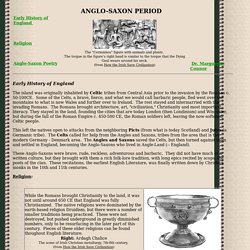
Anglo-Saxon literature - English and Related Literature, The University of York. Overview The poetry and prose of the Anglo-Saxons stands at the beginnings of English literature.
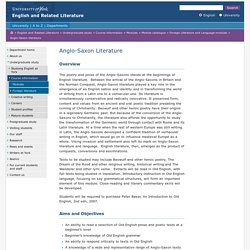
Between the arrival of the Anglo-Saxons in Britain and the Norman Conquest, Anglo-Saxon literature played a key role in the emergence of an English nation and identity and in transforming the world of writing from a Latin one to a vernacular one. Its literature is simultaneously conservative and radically innovative. It preserved form, content and values from an ancient and oral poetic tradition predating the coming of Christianity: Beowulf and other heroic poetry have their origins in a legendary Germanic past.
The Anglo-Saxon kings. In the Dark Ages during the fifth and sixth centuries, communities of peoples in Britain inhabited homelands with ill-defined borders.
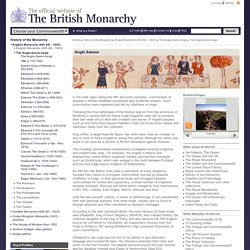
Such communities were organised and led by chieftains or kings. Following the final withdrawal of the Roman legions from the provinces of Britannia in around 408 AD these small kingdoms were left to preserve their own order and to deal with invaders and waves of migrant peoples such as the Picts from beyond Hadrian's Wall, the Scots from Ireland and Germanic tribes from the continent. King Arthur, a larger-than-life figure, has often been cited as a leader of one or more of these kingdoms during this period, although his name now tends to be used as a symbol of British resistance against invasion.
The invading communities overwhelmed or adapted existing kingdoms and created new ones - for example, the Angles in Mercia and Northumbria. Ethelberht's law code was the first to be written in any Germanic language and included 90 laws. Featured English Monarch. Anglo-Saxon. Anglo-Saxon, term used historically to describe any member of the Germanic peoples who, from the 5th century ce to the time of the Norman Conquest (1066), inhabited and ruled territories that are today part of England and Wales.
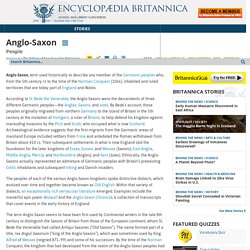
According to St. Bede the Venerable, the Anglo-Saxons were the descendants of three different Germanic peoples—the Angles, Saxons, and Jutes. By Bede’s account, those peoples originally migrated from northern Germany to the island of Britain in the 5th century at the invitation of Vortigern, a ruler of Britons, to help defend his kingdom against marauding invasions by the Picts and Scotti, who occupied what is now Scotland. Archaeological evidence suggests that the first migrants from the Germanic areas of mainland Europe included settlers from Frisia and antedated the Roman withdrawal from Britain about 410 ce. History - Ancient History in depth: The Anglo-Saxons. Anglo-Saxon life. Life and Religion It is difficult to generalize about an era as lengthy as the Dark Ages, but we'll do it anyway.
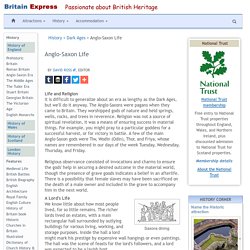
The Anglo-Saxons were pagans when they came to Britain. They worshipped gods of nature and held springs, wells, rocks, and trees in reverence. Religion was not a source of spiritual revelation, it was a means of ensuring success in material things. For example, you might pray to a particular goddess for a successful harvest, or for victory in battle. Anglo-saxon.